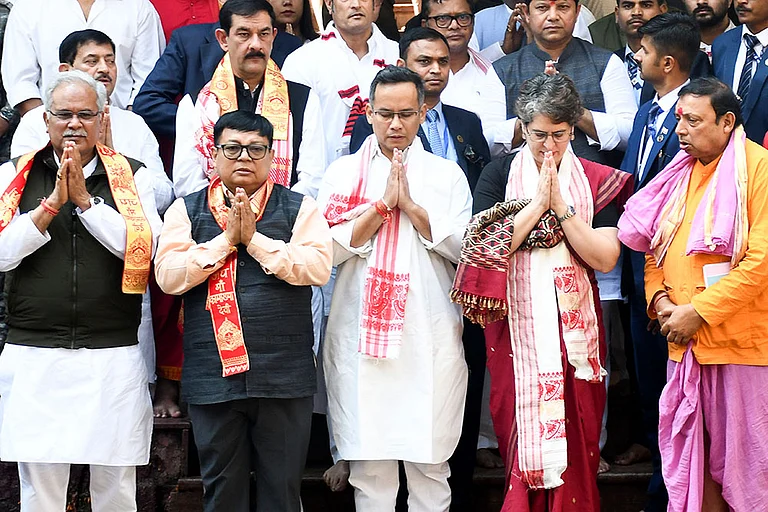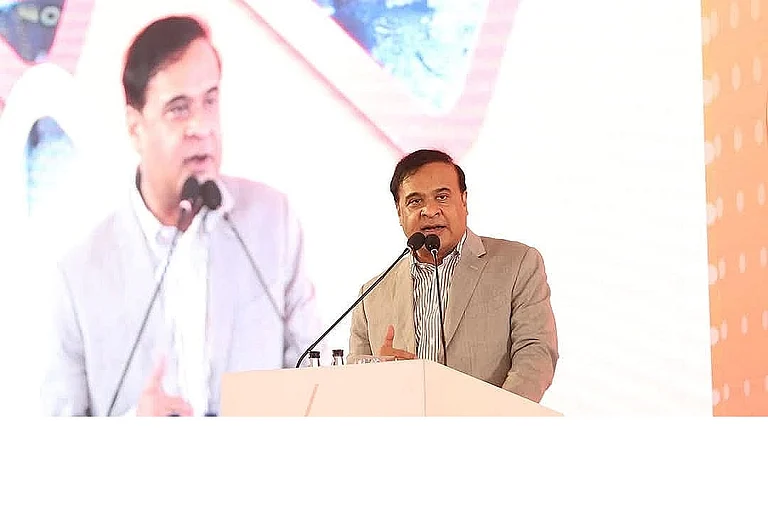Munindra Sharma is 49-years-old. But with his lean body, wrinkled face, and dreadlocks, he would look no less than 60. He keeps saying the same thing, “The man who killed my son is also an Assamese. Is humanity lost? I am saying that I will compensate for whatever loss my son has done to him. We are so poor that I go out and beg to feed my family. My son went there for money and he got killed. But God will give us justice.”
In between talks he would go out to the courtyard, feed the chickens, water the plants, and return to say the same thing. His son Sanjib Sharma is one of the two youths who were served death sentences on Saturday by the outlawed United Liberation Front of Assam (Independent), a separatist organisation fighting for an independent nation out of the Union of India for more than 40 years.
His colleague Dhanjit Das, 33, met the same fate. Dhanjit, a father of a four-year-old, went to join the organisation around two months back. Sharma disappeared from home about a year ago.
The organisation has confirmed that both the youths were sentenced to death by a ULFA kangaroo court after they were proven guilty of spying on behalf of security forces, planning to kill ULFA functionaries, motivating fellow cadres to surrender, and installing sophisticated communication devices in its Myanmar camp to deliver information to the police and Army.
In April, Assam Chief Minister Himanta Biswa Sarma had said that ULFA (Independent) had recruited 47 youths from Assam through various social media platforms. These youths included an Assam Congress district secretary.
Terming the incident as sad, Sarma said the incident is a message to youth who are willing to join the outfit.
Sarma also denied ULFA claims that Assam Police had sent the youths as spies to its camps.
He said, “If the statement of giving death sentence is true, then it’s indeed very sad. This incident should be a message to those youths who intend to join the outfit. The people of the state have seen bloodbaths in the past. Apart from mothers losing their sons, we haven’t reached any goals by such acts. I urge ULFA to sit in peace talks so we don’t need to hear such sad news."
The United Liberation Front of Assam became active in the early 1980s. Its primary objective is “to liberate Assam from Indian colonial rule” and form a “Sovereign, Socialist Assam” through an armed struggle. It was declared a banned organisation after 11 years on November 27, 1990 under the Unlawful Activities Prevention Act (1967). Many months later, the ULFA had started enjoying the hospitality of anti-India forces in Bangladesh.
However, when the Awami League government led by Sheikh Hasina came to power in the neighbouring country, it came down heavily on ULFA and ended the support in terms of logistics and camps. It was during that time in 2015 that Anup Chetia was extradited from Bangladesh to Assam.
However, another country, Myanmar, continued to be a safe haven for ULFA and other militant groups of the region. It is believed to be at the Arakan Camp in Myanmar that the two “spies” were put in front of the firing squad on Saturday morning.
The peace process
When ULFA (Independent) declared a unilateral ceasefire in May 2021, right after Himanta Biswa Sarma became the state’s chief minister, it was seen as a positive step in the long-drawn armed struggle. It cited the Covid-19 pandemic as the reason for declaring ceasefire, but it came at a time when several leaders of the organisation were surrendering from the camps of Myanmar.
However, Rajeev Bhattacharyya, a senior journalist from the Northeast, said Paresh Baruah, the chief of staff of ULFA (Independent), has been very clear in his negotiations with the Government of India on making peace.
Bhattacharyya is one among few journalists to have visited the central headquarters of ULFA and other insurgent groups in Myanmar.
Bhattacharyya told Outlook, “In the past several months, ULFA (Independent) chief Paresh Baruah has indicated in several interviews that he is unwilling to seek for talks without Assam’s sovereignty on the agenda of discussions. On the other hand, Assam CM Himanta Biswa Sarma has categorically stated that the discussion on that issue could not be possible. So, perhaps, the situation has been quite clear even before the "spies" were produced before the firing squad.”
It was thought that the ice would be broken after Sarma became CM, but nothing of that sort has happened in reality because both the government and militant outfits are unwavering on their positions, according to Bhattacharyya.
ULFA commander-in-chief Paresh Baruah, after the execution of the two recruits on Saturday morning, told the local media that ULFA wants the lost sovereignty of the state back and that the issue must be discussed.
He said, “We have been showing interest for respectful discussion with the government but only if our historic issue of sovereignty is discussed, otherwise there would be no discussion. Earlier also the police had done such acts (sending spies to ULFA camps) during the government of Tarun Gogoi, Sarbananda Sonowal and other governments. Now it is up to the government or the police to take responsibility for the act. We don’t need a war but at the same time we have to defend ourselves.”
There have been several attempts in the past to initiate talks with the ULFA. In the early 1990s, the peace process with ULFA started with a letter by Arovindo Rajkhowa, the then ULFA chairman, to the then Prime Minister PV Narasimha Rao, expressing his willingness to negotiate with the Indian government. However, Paresh Baruah declined to sit for discussions.
The top leaders of ULFA, like Anup Chetia and Pradip Gogoi – who were in Delhi for talks, later fled to Bangladesh to join Baruah on pretence of persuading him to come to the discussion table.
In June 2008, ‘A’ and ‘C’ companies of ULFA’s 28 Battalion offered unilateral ceasefire and renamed themselves ULFA (Pro-Talks). Three years later, another faction of ULFA led by chairman Rajkhowa agreed to unconditionally participate in talks with the Central government. It signed a tripartite agreement in September 2011 for suspension of operations with the Centre and state government.
However, in August 2012 when the peace process was still on with the pro talks faction Paresh Barua expelled Rajkhowa and appointed Abhijit Barman as the chairman of his outfit and rechristened the outfit as ULFA (Independent).
In 2015, Anup Chetia, the founder and general secretary of ULFA, was extradited from Bangladesh. It was hoped that it would further advance the peace negotiations that were going on with the pro-talk faction of ULFA headed by Rajkhowa, after he was expelled from ULFA (I).
However, the peace process was still on with the pro-talks faction in August 2012 when Paresh Barua expelled Rajkhowa and appointed Abhijit Barman as the chairman of his outfit and rechristened the outfit as ULFA (Independent). Rajkhowa later headed the pro-talk section of the ULFA.
In January 2022, pro-talks leader Anup Chetia accused the government of not sitting in any talks for the past two years. Himanta Biswa Sarma has been inviting the outfit for peace talks after becoming Assam’s chief minister. For a while, Paresh Baruah’s goodwill gesture towards the government in the form of declaring a ceasefire raised hopes of an end. However, the discussions always hit a deadlock over non-negotiations on sovereignty from both the sides.
The killing of “spies” though has raised a concern. Bhattacharyya said killing of "spies" by ULFA (Independent) was not new. What is new here is the organisation sending a press statement declaring their sentences and reasons behind it.
He said, “The truth behind this latest spying episode is yet to be unravelled. But there had been many instances in the past. In 2015, over ten people were shot in Myanmar for allegedly spying on behalf of Indian security forces. Only two of the accused managed to escape. But this is the first time a press release was issued after the spies were identified. It is meant to act as a deterrent against future attempts by the security forces and agencies to send spies.”






















